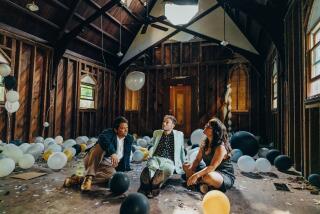Absurdly in the spirit
Andrew W.K. had just finished a piano-and-string-quartet version of his pop-metal hit “Party Hard” on Thursday night when a young man from the audience bum-rushed the stage at Largo at the Coronet. There he stood, seemingly waiting for another of W.K.’s jubilant rockers like “Party Til You Puke” or “It’s Time to Party.”
Instead, W.K. (whose given last name is Wilkes-Krier) and the renowned chamber group the Calder Quartet opted to play two versions of John Cage’s entirely silent composition “4:33.”
It made for a bit of a transcendently awkward moment for the enthusiastic fan, who rifled in his pockets and looked genuinely confused at this turn of events.
W.K. might be best known for wearing filthy white jeans and posing for album covers with his nose gushing blood, but theatrics aside, he is actually a fantastic player and arranger, long schooled in avant-garde noise and composition circles. His ambition has always been to create euphoria in whatever musical setting he chooses, and at Largo, the outlandishness of his set with the Calder Quartet -- with whom he first performed a year ago in New York -- was joyful, galling and revelatory in equal measures.
He immediately demonstrated his skills by matching Calder cellist Eric Byers step-for-step on Bach’s “Prelude in C Major/Ave Maria.” But the set then took one of its many unusual detours as W.K. pretended to forget his parts and smacked at his piano in mock frustration, while the rest of the Calder Quartet sawed at their instruments offstage.
Before long, though, the musicians had all come together for a nimble take on Fred Frith’s “Friendly Gestures #4 and #3,” which was punctuated by W.K.’s grunting and close-miked chewing noises.
The Calder members often barely suppressed giggles as W.K. explored his own private tangents -- like when he interrupted an excellent solo piano run with fist pumps and incantatory screams of “God!,” evoking a hair-metal version of a Stockhausen number.
When the quartet took the reins, they were relaxed and effortless, delivering a sinister and athletic read on Christine Southworth’s “Honey Flyers I-III” and Philip Glass’ “Company I-IV,” which reminded listeners that W.K.’s antics have a long avant-garde tradition.
The strain of absurdism W.K. introduces into his material (as seen in a droll cover of Luther Vandross’ “Dance With My Father”) is intended as a way to tap into the intense, almost precognitive feeling of much experimental music. Singles such as “I Get Wet,” “Dance Party” and “I Love New York City” are expertly calibrated to eliminate any obstructions between listener and jump-kicking rapture.
When the quintet played takes on those songs, the night’s timbre instantly shifted and a dozens-strong wave of boozy dudes came flooding toward the stage. They were soon tamed by that Cage piece, which resurrected a welcome sense of unpredictability.
In the end, he thanked the audience for “taking the risk to come out despite some of us really putting our heads on the chopping block.” If expectation-busting was his goal, his execution was impeccable.
--
More to Read
The biggest entertainment stories
Get our big stories about Hollywood, film, television, music, arts, culture and more right in your inbox as soon as they publish.
You may occasionally receive promotional content from the Los Angeles Times.











